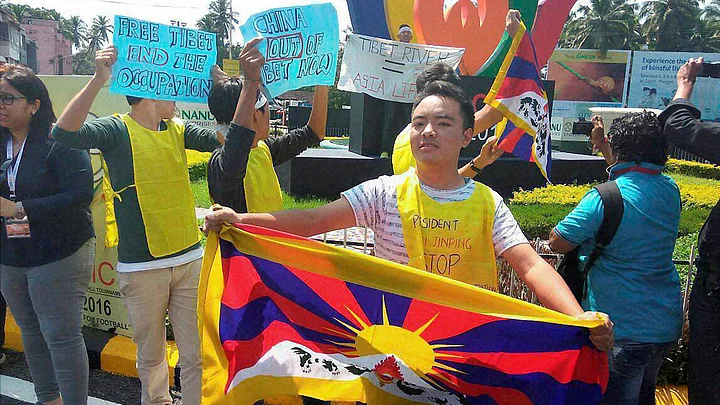On a recent 8 July press briefing at the US State Department, Secretary Mike Pompeo extended a belated Happy Birthday to His Holiness 14th The Dalai Lama. All major Tibetan media outlets reported this news widely. One is hard-pressed to recall if any other high-ranking government officials made similar public announcements in the past.
One may then assume that this year signals a new beginning for the Tibetan struggle after what seems like a long drawn-out dormant period that saw an unfortunate co-relationship between China’s meteoric economic rise and the diminishing hope for Tibet’s future. This year may see a reversal of this co-relation as the world continues to witness Chinese Communist Party’s (CCP) unexpected fall from grace following its botched response to the COVID-19 outbreak.
One more welcome news was that Secretary Pompeo sharpened his focus to Chinese telecom giant Huawei, a firm that he has previously described as a “Trojan horse for Chinese intelligence”. The Secretary’s designation of Huawei as the “Trojan Horse” of the CCP was a powerful analogy. It was indeed a vivid visual representation and fully captured the old proverb, “a picture is worth a thousand words”. Drawing inspiration from the Trojan Horse analogy, I started to pen my observations to provide a fresh perspective on a few selected Tibetan historical events.
China’s Cultural Invasion
Firstly, for a bit of historical perspective on the origin of this expression, the Trojan Horse is considered one of history’s most famous tricks that the Greeks played when laying siege to Troy’s city to end its 10-year war in the 12th century BC. Conceived by Ulysses, the Greeks built a giant wooden horse and left it outside the city.
The Trojans brought the horse inside the city, as they believed it was a peace offering, but fully armed Ulysses and about fifty Achean warriors were hiding inside. Later that night, while the tired and drunken Trojans were asleep, the fifty warriors got out of the wooden horse and opened the city gates for the rest of their army. Then, they conquered the city.
The history of Tibet is unfortunately replete with instances wherein Tibetans became victims of the CCP’s Trojan Horses year after year. Perhaps the most glaring one is the 17-point “Agreement on Measures for the Peaceful Liberation of Tibet,” which the People’s Republic of China (PRC) forced Tibet to sign on 23 May 1951. Much against their wishes, the Tibetan government tried to abide by the terms of this document.
On the other hand, China showed total disregard for the spirit of the “Agreement” and unleashed unbearable atrocities upon the Tibetan people to expedite Tibet’s occupation and destroy its distinct cultural heritage. Far from being a peaceful liberation, Tibetans’ psychological, physical, and emotional trauma continues to this day unabated.
This CCP’s Trojan Horse is likely to be remembered in history as the one with the longest streak of trickery at work, spinning off disinformation after disinformation.
For instance, a good case in point is the CCP’s national minority language policy.
China’s constitution guarantees full protection and freedom of ethnic minorities to use and develop their spoken and written languages in administration, the judiciary, and education. But in reality, CCP is “gradually replacing the languages of China’s minorities with the Chinese language, and the government has started the process to replace Uighur and Tibetan languages in schools in the Xinjiang Uyghur Autonomous Region and the Tibetan Autonomous Region, introducing Mandarin as the medium of instruction.”
In December of 1978, Deng Xiaoping initiated the Beijing-Dharamsala dialogue with His Holiness, which was considered the most significant development in the Sino-Tibet relationship since 1959. The Tibetan community in exile was euphoric at this welcome news, and an early return to their homeland then seemed more plausible than ever before.
However, this initial excitement was short-lived as a tangible outcome was elusive. Dawa Norbu’s (1997) research showed that “the primary motive was and still is to persuade the self-exiled Tibetan leader to return to the motherland”. China’s economic and political relationship with the West was precarious in those days. This dialogue could have been used as a pretext and evidence of liberalisation to garner stronger economic ties with the West. The US granted the “Most Favored Nation” status to China, which was then signed into law by President Clinton on 10 October 2000.
‘Tibet Ruined by Its Hopes’
Fittingly, there is an old saying that roughly translates to, ‘China is ruined by its doubt, while Tibet by its hopes’. For so many years, Tibetans have hoped that the CCP’s Trojan Horse would stop its treachery, only to be continuously disappointed that nothing has changed. On the contrary, the Trojan Horse has become more ominous and far-reaching in spreading its malice.
Another CCP’s massive Trojan Horse is Chinese telecom giant Huawei pretending to be an innocent telecommunication company. However, the US Secretary has called it what it is, a national security threat, and a “Trojan Horse for Chinese Intelligence”. Make no mistake, popular social media apps, such as WeChat, are bred to serve the CCP above all. It is no wonder India has banned 59 Chinese Apps.
What is, then, the lesson for Tibetans who are likely to be susceptible to these Trojan Horse tactics? We must be extra vigilant at all times, especially when the CCP is being questioned for its activities with a new approach known as "distrust and then verify”.
(The author was the Chair of the Department of Elementary and Bilingual Education at California State University, Fullerton, until he retired in July 2020. The opinions expressed are the author’s own. The Quint neither endorses nor is responsible for them)
(At The Quint, we question everything. Play an active role in shaping our journalism by becoming a member today.)
